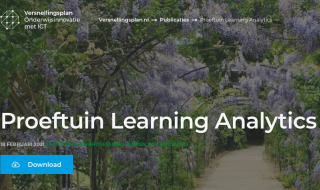Study data & learning analytics
Starting study dates
Defining goals for deployment of study data
The goals for using study data are different for all institutions. They must be appropriate to, for example, an institution's size, circumstances, educational vision, and type of students. Every educational institution will therefore have to formulate its own ambitions as to why and how it wants to use study data.

Where do you start when you want to start deploying learning analytics? What do you want to achieve. Who should you involve? And what else should you think about? The discussion model will help you get started. Within the discussion model, you address your goals, target group, use of data, vision and policy, stakeholders, privacy and ethics.
Learning analytics living lab

Are you a teacher and want to be shown how to use study data within your own teaching? Then take advantage of the Learning Analytics Living Lab of the Teacher Professionalisation acceleration zone. SURF contributed to the series of six meetings on educational purpose, ethics, data quality, privacy, data management and more.
Considerations for a safe and reliable infrastructure

Is your institution developing or buying an infrastructure for learning analytics or analysing study data? If so, you need to make various considerations when it comes to privacy, ethics and functionality. SURF has drawn up a number of concerns and questions.
Exploration Control of study data by students

Institutions collect a lot of data about and from students. More direction on this data from the student perspective is desirable, so that the student has insight and control over the processing of personal data within the educational process. But what are the options for an infrastructure for directing student data?
Vision and strategy workshops
SURF offers vision and strategy workshops for educational institutions. We help institutions sharpen their ambitions regarding the use of study data. We make the insights gained by participating institutions in a vision creation process available to the other institutions. We connect institutions with similar visions and bring other perspectives into discussions.
Position paper on the use of study data
SURF examines what values institutions have in common regarding the use of learning analytics, what common needs there are in terms of a learning analytics infrastructure, and what preconditions in terms of algorithms, privacy and ethics we share.
Supporting teachers
The successful deployment of learning analytics hinges on how study data is applied in teaching practice. It only really works if we manage to ask the right questions of the data. This starts as early as the design of online education.
The report Learning analytics in education: an educational perspective contains a number of cases in which we show how this can work in educational practice. The report supports and inspires teachers and educational developers to apply study data within online education. This allows them to collect data on how students click through an online environment, what videos they watch, what other digital footprints they leave behind and what that says about their learning behaviour.